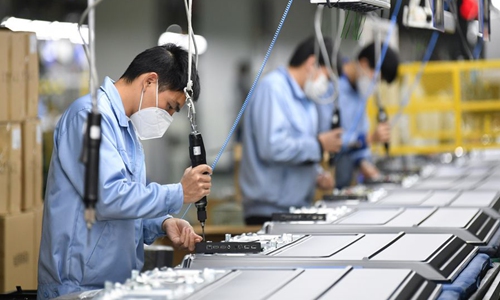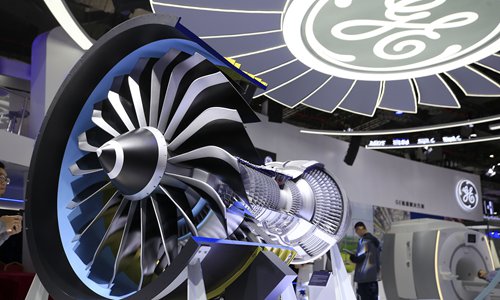HOME >> SOURCE,SPECIAL-COVERAGE
US wields trade stick on China amid epidemic
By Wang Cong Source:Global Times Published: 2020/2/20 19:53:40 Last Updated: 2020/2/21 1:26:04
Fresh actions pose menace for bilateral ties, global economy

Staff members work at a workshop of Skyworth in Guangzhou, south China's Guangdong Province, Feb. 10, 2020. Chinese authorities are carefully balancing efforts to control the novel coronavirus epidemic and minimize its impact on the economy as millions of people head back to work Monday after an extended holiday. Photo: Xinhua
Even as the world is grappling with the coronavirus epidemic with potentially grave human and economic costs and even after China-US phase one trade agreement was signed just a month ago, the US has shown no sign of dialing back its toxic policies toward China and rather appears to be doubling down with a series of fresh actions and threats, throwing recently thawing trade relations and an already-troubled global economy into further profound uncertainty.
Washington's threatening of more restrictions on trade in technologies with China and more tariffs on Chinese products might have been a familiar gambit it has deployed before extracting more concessions from Beijing in phase two trade talks, but, in a broader sense, they are part of certain US elements' ideologically-driven attempt to contain China, Chinese analysts said on Thursday. Nonetheless, such ill attempts while escalating tensions would not force China to give any ground on core issues, let alone to a downfall, analysts noted.
Fresh threats
As Chinese officials are busy combating the deadly coronavirus, US officials are not taking any break. Since the epidemic in China gained national attention in mid-January, the US has moved to ban foreign nationals with travel history to the Chinese mainland in the past 14 days, charged Chinese telecom firm Huawei with racketeering, finalized a new rule that allows tariffs on products from China and other countries that it deems to have undervalued their currencies, and removed China from its list of "developing" nations that paves the way for more duties on Chinese goods.
Washington's efforts did not stop there. At the Munich Security Conference in Germany earlier this week, US politicians, including Secretary of State Mike Pompeo and Speaker of the House of Representatives Nancy Pelosi, went to extra lengths to smear China's political and economic system and technologies with a cascade of baseless yet fearmongering charges.
"While this type of rhetoric is not new, the recent escalations, under the context of the epidemic in China, make it hard to not suspect that some in the US want to kick China when it's down," Huo Jianguo, vice chairman of the China Society for World Trade Organization Studies in Beijing, told the Global Times on Thursday. "We didn't expect the phase one agreement would change the US' overall strategy to contain China, but we thought it would cool the situation down at least for a while."
China and the US signed a phase one agreement in mid-January, under which China agreed to increase purchase of US goods by $200 billion over the next two years and the US would roll back tariffs in phases.
In spite of the tremendous challenges posed by the epidemic, China has taken a slew of measures to implement the agreement. Among other things, China has cut tariffs on $75 billion worth of US goods and said it would allow tariff exemptions for nearly 700 US products. Over the past two weeks, China has also granted access to three US financial institutions including Mastercard Inc.
Chinese officials have also repeatedly said that they would carry out the deal as planned.
"China is carrying out the terms under the phase one agreement in an orderly fashion, but in direct opposite, the US' policy toward China has not eased because of the epidemic in China and the implementation of the phase one deal," Song Guoyou, director of the Fudan University's Center for Economic Diplomacy, told the Global Times on Thursday, noting that a US plan to block sales of airplane components to China might violate the phase one deal.
US officials were reportedly considering whether to ban US companies General Electric Co and Honeywell International Inc from supplying airplane engines and flight control systems for China's home-grown passenger jet, the C919.
US President Donald Trump has since sought to dismiss such a plan, claiming in a tweet on Tuesday that "I want China to buy our jet engines" and "[the US] is open for business."

An aero-engine made by General Electric (GE), an American multinational conglomerate, is displayed at CIIE. Photo: Yang Hui/GT
Firm ground
However, the mixed signals from Washington also fueled suspicion in China that US officials, as they have done before, are exerting maximum pressure to force China to give more grounds in negotiations for a phase two agreement, which is expected to focus on thornier issues such as US' accusations against China's state-owned firms and industrial policies. Under such a strategy, US officials could also target more Chinese companies including in energy and financial sectors.
While the US could hit China in some vulnerable areas such as chips and jet engines, "there is no need to be too afraid," said Song, adding that the US actions will also hurt itself and China will be able to overcome the difficulties and could even make breakthroughs in the areas faster under the US pressure.
Still, the escalation in the US' hostility toward China both in trade and ideologically-driven politics also casts a dark cloud over the global economy, which is already coping with the lasting impact of the trade war and a potentially serious blow from the epidemic.
"At such a difficult time during the epidemic, US actions show that it has chosen to put the political benefit of some stakeholders over the interest of the entire international community," Li Yong, a deputy chairman of the expert committee of the China Association of International Trade, told the Global Times on Thursday, adding that US' actions are detrimental to the global economy if they led to further escalations in tensions between China and the US.
In what some analysts call a sign of widening disputes between the two countries, the US on Tuesday put restrictions designed for diplomats on five Chinese media organizations and China on Wednesday revoked the press credentials of three reporters for the Wall Street Journal, after the US newspaper repeatedly brushed aside complaints and outrage from Chinese officials and citizens over a racist headline that described China as the "real sick man of Asia."
Though the two actions are not related and different in nature, they underlined further divergence between the two countries driven by the US' extreme ideology-driven actions to contain China at all costs. "Such fear-based Sinophobic actions will not force China into a downfall as they desire," Li said.
Posted in: ECONOMY,FOCUS